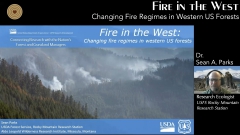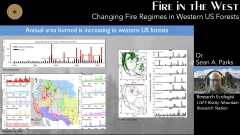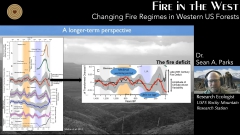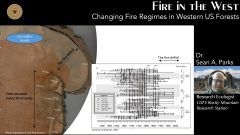Mar 28 2022
World Wood Day Foundation and International Wood Culture Society (IWCS) are honored to work with Rocky Mountain Research Station (RMRS), to present a series of videos: Fire in the West.
In the last few decades, wildfires in the west have become an increasing problem for the USA. Through presentations and discussions with experienced researchers, we would like to open a conversation to the public about how and why wildfires occur and hope to bring more awareness and understanding about them.
In this video, we have invited Dr. Sean A. Parks, Research Ecologist with Rocky Mountain Research Station (RMRS) and Jessica Brewen, Science Delivery specialist with RMRS. Hosted by Mr. Steve Ambrose, retired Forest Service employee and now volunteer for IWCS, this presentation and discussion demonstrate how and why fire regimes in western US forests have been changed.
Outlines:
Presentation by RMRS Research Ecologist: Dr. Sean A. Parks –
Changing Fire Regimes in Western US Forests
# We are seeing increasing area burns in western US landscapes.
# High severity fire burns all or most trees in a forest.
# Natural drought cycle and fire.
# We might be see more extreme fires in the future.
# The importance of fire deficit from late 1800s.
# Less fire or more fire?
# Fire regime.
# What fire scar can tell us.
# Dry forests in western US.
# Difficulties of forests to recover after high severity fire.
# Lessons from wilderness.
Group discussion: Q&A
# The effect of Johnson fire in 2021.
# Possibility of the small section with stand replacing fire area to recover.
# What dendrochronology could tell us about the drought.
# Intentional burning of indigenous people prior to 1800.
# Fire is maintaining the forest.
# Could we nurse the seedlings to be more resistant to drought condition?
# Mega fires today.
# Difference and similarity between modern prescribed fires and cultural fires in the past.
# Are we doing enough prescribed fires?
# Save what we have instead of trying to restore what we had.
# What regular people could do to help?
# Reason for more moist and colder areas to have extreme fires.
# Do tree species start moving due to climate change?
More information about Wildland Fire Management Strategy:
https://www.forestsandrangelands.gov/strategy/thestrategy.shtml
More information about RMRS and Aldo Leopold Wilderness Research Institute:
https://www.fs.usda.gov/rmrs/
https://www.fs.usda.gov/rmrs/science-program-areas/aldo-leopold-wilderness-research-institute
More World Wood Day and Fire in the West information:
https://www.fs.usda.gov/rmrs/events/world-wood-day
http://www.worldwoodday.org/2022/regions_event/45
More questions? Contact our presenters!
https://www.fs.fed.us/research/people/profile.php?alias=sean_parks




